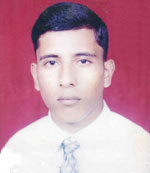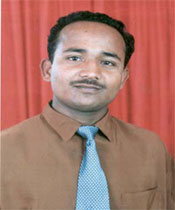Related Links
Case Updates
Krishna Adhikari
 On 6 June 2004, Krishna Prasad Adhikari, a resident of Fujel village of Gorkha District, was murdered in Chitwan District by Maoist cadres. Krishna Prasad was visiting his grandparents after having taken the SLC examinations, and he was abducted from Bakullahar Chowk by men who came on a motorcycle ...
On 6 June 2004, Krishna Prasad Adhikari, a resident of Fujel village of Gorkha District, was murdered in Chitwan District by Maoist cadres. Krishna Prasad was visiting his grandparents after having taken the SLC examinations, and he was abducted from Bakullahar Chowk by men who came on a motorcycle ... Maina Sunuwar
 Around 6 am on February 17, 2004, a group of RNA soldiers arrested Ms
Maina Sunuwar, a 15-year-old schoolgirl of Kharelthok VDC-6, Kavre
district. She disappeared since her arrest. Her family members, with
support from villagers and school where Maina was a student, visited
detention centers ...
Around 6 am on February 17, 2004, a group of RNA soldiers arrested Ms
Maina Sunuwar, a 15-year-old schoolgirl of Kharelthok VDC-6, Kavre
district. She disappeared since her arrest. Her family members, with
support from villagers and school where Maina was a student, visited
detention centers ... Sanjeev Kumar Karna
 Sanjeev Kumar Karna was one among the 11 persons arrested on October 8, 2003. On that fateful day, they had gone to attend a picnic program organized by the students at a place called Kariyachauri VDC-4, and from picnic, they went to Kataiya Chowri Area of Dhanusha district where they ate some food ...
Sanjeev Kumar Karna was one among the 11 persons arrested on October 8, 2003. On that fateful day, they had gone to attend a picnic program organized by the students at a place called Kariyachauri VDC-4, and from picnic, they went to Kataiya Chowri Area of Dhanusha district where they ate some food ... Arjun Bahadur Lama
Hari Prasad Bolakhe
Sarala Sapkota
Birendra Shah
Bishwanath Parajuli, Tom Nath Poudel and Dhan Bahadur Tamang
Chot Nath Ghimire and Shekhar Nath Ghimire
Bhauna Tharu
AF Joins Int'l Campaigns on Preventing Security Personnel Tainted with HRV Serving as Peacekeepers
Tainted UN Peacekeepers: Reportage from the Ground
i. Can UN allow its staff to violate human rights?
The United Nations (UN) employs one of the largest armies in the world. Currently, it has more than 97,000 uniformed personnel (military and police) coming from over 110 countries and the number has been steadily growing.
While the debate between the troops contributing countries and top funders of the UN peacekeeping operations (UNPKOs) continues on a range of issues relating to peacekeeping, the responsibility of the states selecting peacekeepers to perform duties for and on behalf of the UN has seldom been discussed. Can the UN allow people who have been involved in human rights violations as peacekeepers? There have been consistent reports of serious violations in particular sexual exploitation and abuses by peacekeepers. Have those committed such violations committed these before their selection? Are countries exporting human rights violators to countries in need of peacekeepers?
ii. Reportage from the ground of the Troops Contributing Countries: Violators selected as peacekeepers
The research on the deployment of the peacekeepers from four major troops contributing countries i.e. Bangladesh, India, Nepal and Nigeria by Asian Centre for Human Rights (ACHR) of India, Advocacy Forum (AF) of Nepal and Civil Society Legislative Advocacy Centre (CISLAC) of Nigeria makes startling findings.
Bangladesh and Nigeria have no public procedures for selection of peacekeepers and the their selection in these countries has been marred by corruption and nepotism. India has a policy for selection of its UN peacekeepers but it gives “preference to those who have proven themselves while serving in counter-insurgency operations”[1] or “have served for at least two years in the hard/extreme hard areas like Jammu and Kashmir, North East region or the Naxal Affected states”[2]. The involvement of security forces of Bangladesh, India, Nepal and Nigeria in human rights violations, especially in conflict situations, require little introduction. It is clear that human rights violators have often been given preference for deployment as UN peacekeepers.
Even the UN Civilian Police who are selected through the UN-administered Selection Assistance and Assessment Team (SAAT) Test has not been free of human rights violators. In the SAAT Test held in 2013 by India those selected included Sanjeev Kumar, Assistant Sub-Inspector of Punjab Police accused of torture,[3] Superintendent of Police Altaf Ahmad Khan of Jammu and Kashmir Police accused of rape and custodial death,[4] Head Constable Shiv Charan of Chandigarh Police already arrested by police on the charge of kidnapping and extortion,[5] and Inspector Atul Soni of Punjab Police arrested under Section 25 of the Arms Act for carrying 52 live cartridges of different calibers at the Indira Gandhi International Airport in New Delhi while boarding a Philippines Airlines flight to Manila.[6]
From Nepal, where the procedures for selection stress that those “convicted” of human rights violations, cannot be selected for peacekeeping, at least three peacekeepers had to be repatriated after it became known that they were involved in torture, death in custody and disappearance.
iii. Reportage from the ground of the troops’ recipient countries: Violators continue the abuses
The UN peacekeepers from these four countries were also responsible for serious human rights violations, in particular sexual exploitation and abuses, in the troops’ recipient countries.
Indian peacekeepers were accused of series of sexual abuse and exploitation in the UN Organization Mission in the Democratic Republic of Congo (MONUC). The UN Office of Internal Oversight Services (OIOS) confirmed sexual exploitation and abuses by peacekeepers and made eight recommendations including to the MONUC Force Commander and the Contingent commanders.[7] Despite this, sexual exploitation and abuses by the Indian troops continued unabated. A subsequent investigation by the OIOS found corroborative evidence in six cases of sexual abuses between July and November 2007. Further, the DNA testing by the OIOS in May 2008 concluded that children born in the area had “distinctive Indian features” confirming the allegations of sexual abuse and exploitation.[8]
Nigeria’s peacekeepers were accused of corruption,[9] involvement in illegal diamond trade, making false passports, drug smuggling and other illegal activities, apart from sexual exploitation and abuse.[10] In 2005, 11 Nigerian policemen serving with MONUC had to be withdrawn and subsequently suspended from duty after a special investigation panel found corroborating evidence of sexual exploitation and abuse, including against the commander.[11] During the peacekeeping mission in Sierra Leone, Major General Vijay Kumar Jetley complained about the corruption of the Nigerian peacekeeping forces[12] and that the Nigerian Army “has obstructed peace moves in Sierra Leone because its officers and men are getting rich through illegally trading diamonds.”[13] Though the Nigerian Army contested General Jetley’s allegations,[14] the Nigerian Army’s earlier requests to command the UN mission in Sierra Leone was turned down due to its “patchy record in previous attempts to restore peace.”[15]
Bangladeshi security forces have also been involved in sexual exploitation during peacekeeping missions. In 2007 four Bangladeshi peacekeepers deployed to the UN Mission in Sudan had to be repatriated following investigations into allegations of sexual exploitation and abuse of children.[16] The UN announced its intention to follow up with the Government of Bangladesh for prosecution[17] but the Government of Bangladesh failed to indicate publicly as to whether any action had been taken against the accused.
vi. The challenge before the UN and international community
The UN Peacekeeping missions stand blemished. The UN had to repatriate Captain Niranjan Basnet of the Nepal Army (NA), an accused in the murder of Maina Sunuwar[18] from peacekeeping mission in Chad and Deputy Superintendent of Police Basanta Kunwar, an accused of torture[19], from peacekeeping mission in Liberia.[20] In January 2013, British Police arrested Colonel Kumar Lama, accused of torture in Nepal in 2005, while on leave in UK while serving as an expert with the UN mission in South Sudan.[21]
India failed to live upto its commitment of providing full support for the "implementation of a policy of zero tolerance with regard to conduct and discipline of troops including, sexual exploitation and abuse”.[22] With respect to sexual exploitation committed by the Indian troops during their deployment with the MUNOC (see above), in November 2012, the Chief of Army Staff, General Bikram Singh who himself was the Deputy Force Commander under the MUNOC at the time of commission of the crimes, told the media that the Court of Inquiry had found one person responsible for sexual abuse and three others for command and control failure.[23] However, in a letter dated 1 April 2013, Major General Anil Mehta of the Army Headquarters stated that the “investigation on the subject incident is still not completed”.[24]
The UN has also failed to take into consideration the impact of peacekeeping operations on the national political system. The UN peacekeeping deployment had been so lucrative[25] that the Bangladesh Army has monopolised the deployment in the UN peacekeeping missions. In fact, the denial of opportunity to the Bangladesh Rifles (BDR) to be deployed as UN peacekeepers was one of the reasons for the revolt at the BDR Headquarters at Pilkhana, Dhaka on 25 February 2009 in which a total of 74 persons including 57 Army Officers deputed to the BDR from the Bangladesh army were massacred. The Bangladesh Army and the government continue to maintain that the “United Nations has objected to the proposal of BDR members being taken to foreign missions. Bangladesh Government has no jurisdiction in this matter”.[26] This is a blatant lie considering that neighbouring India has been sending its Border Security Force, equivalent of the BDR in Bangladesh, on UN missions.[27] Further, participation in UNPKOs has become the official raison d'etre for increasing the military expenditure of the country by over 11% during Financial Year 2011-12.[28]
The UN introduced “Human Rights Screening of United Nations Personnel” policy in December 2012, which seeks to verify the antecedents of UN Peacekeepers at the level of Force Commanders and Deputy Force Commanders. While it is a good beginning, it may not be sufficient to address the menace.
In January 2013, the Government of Nepal announced new Army Service Regulations[29] to comply with the August 2012 judgement of the Supreme Court of Nepal to establish vetting laws to regulate the recruitment, promotion and transfer of government officials, including those from the security services. However, the actual selection policy remains inaccessible to the public. As long as impunity remains pervasive in the country, having the criteria that those “convicted” of human rights violations are not eligible (rather than those “involved” as required in the UN policy) is meaningless.
The UN ought to encourage initiatives to bring national level standards for deployment of UN peacekeepers policies fully in line with the UN policy. Further, there is a need to establish transparent and exemplary accountability for those peacekeepers who are found guilty of human rights violations, including sexual abuse and exploitation, while on mission.
Full reports are available at:
Bangladesh:
http://www.achrweb.org/reports/DPKO-Bangladesh.pdf
India:
http://www.achrweb.org/reports/DPKO-India.pdf
Nepal:
http://www.achrweb.org/reports/DPKO-Nepal.pdf
Nigeria:
http://www.achrweb.org/reports/DPKO-Nigeria.pdf
[1]. See Delhi High Court judgement in the case of Naib Subedar K.C. Jena vs Union of India & Ors. on 1 February, 2010 [W.P.(C) No.7994/2009 & C.M. No.4481/2009] judgement available at http://delhicourts.nic.in/Feb10/Naib%20Subedar%20K.C.%20Jena%20Vs.%20UOI.pdf.
[2]. See criteria for selection of officers for deployment with UN/Foreign Missions, available at http://bsf.nic.in/doc/recruitment/r46.pdf.
[3]. ASI booked for making inmates dance in nude, The Tribune, 7 February 2005.
[4]. Lesson in irony: Gallantry award goes to rape accused, Tehelka, 17 August 2012, available at: http://archive.tehelka.com/story_main53.asp?filename=Ws170812JK.asp.
[5]. Head Constable held for kidnapping, extortion, The Tribune, 27 February 2006
[6]. Held with live ammo, Punjab cop gets bail, The Tribune, 14 June 2012, available at: http://www.tribuneindia.com/2012/20120614/punjab.htm#12.
[7] . Investigation by the Office of Internal Oversight Services into allegations of sexual exploitation and abuse in the United Nations Organization Mission in the Democratic Republic of the Congo, UN General Assembly Document No. A/59/661 dated 5 January 2005.
[8]. See Varinder Bhatia, Indian Army probes reports of its UN peacekeepers fathering kids in Congo, The Indian Express, 07 June 2011, available at: http://www.indianexpress.com/news/indian-army-probes-reports-of-its-un-peacekeepers-fathering-kids-in-congo/800244/.
[9].See Ewen MacAskill, UN gets warning shot peacekeeping, Huge corruption in Sierra Leone shows the need for rapid reform, available at http://www.theguardian.com/world/2000/sep/09/sierraleone2, last accessed on 14 February 2014.See also The Sierra Web, Report on the Crisis in Sierra Leone, available at http://www.sierra-leone.org/Other-Conflict/jetley-0500.html.
[10]. Ibid.
[11]. See Agence France-Presse, 11 Nigerian police peacekeepers sanctioned over sex scandal in DR Congo, Reliefweb, 26 September 2005, available at http://reliefweb.int/report/democratic-republic-congo/11-nigerian-police-peacekeepers-sanctioned-over-sex-scandal-dr; BBC, Nigeria acts on police sex abuse, 27 September 2005, available at http://news.bbc.co.uk/2/hi/africa/4285650.stm; United Nations Secretary-General Ban Ki-moon, Statement attributable to the Spokesman for the Secretary-General on the recall of a Nigerian unit from MONUC, available at http://www.un.org/sg/statements/?nid=1677 and Wikileaks, Cable 05KINSHASA1501_a, 16 September 2005, available at http://www.wikileaks.org/plusd/cables/05KINSHASA1501_a.html and Cable 05KINSHASA1484_a, 14 September 2005, available at http://www.wikileaks.org/plusd/cables/05KINSHASA1484_a.html.
[12]. See Ewen MacAskill, UN gets warning shot peacekeeping, Huge corruption in Sierra Leone shows the need for rapid reform, available at http://www.theguardian.com/world/2000/sep/09/sierraleone2, last accessed on 14 February 2014.See also The Sierra Web, Report on the Crisis in Sierra Leone, available at http://www.sierra-leone.org/Other-Conflict/jetley-0500.html, last accessed on 14 February 2014.
[13]. See Ewen MacAskill, UN gets warning shot peacekeeping, Huge corruption in Sierra Leone shows the need for rapid reform, available at http://www.theguardian.com/world/2000/sep/09/sierraleone2, last accessed on 14 February 2014.See also The Sierra Web, Report on the Crisis in Sierra Leone, available at http://www.sierra-leone.org/Other-Conflict/jetley-0500.html, last accessed on 14 February 2014.
[14]. See BBC, Nigeria: Sack UN force commander, available at http://news.bbc.co.uk/2/hi/africa/917962.stm, last accessed on 14 February 2014.
[15]. Major-General Jetley was replaced, although varying reasons were given for his replacement, such as the expansion of the mission and the need for a three star general (he was only a two star general). See BBC, Nigeria: Sack UN force commander, available at http://news.bbc.co.uk/2/hi/africa/917962.stm, last accessed on 14 February 2014. See also BBC, UN announces Sierra Leone shake-up, 23 September 2000, available at http://news.bbc.co.uk/2/hi/africa/938281.stm, last accessed on 14 February 2014.
[16]. See Wikileaks, Cable No. 07KHAROUM31_a, 8 January 2007, available at: http://www.wikileaks.org/plusd/cables/07KHARTOUM31_a.html, last accessed on 4 October 2013. See also UN News Centre, Four peacekeepers accused of sex abuse already repatriated – UN mission in Sudan, available at: http://www.un.org/apps/news/story.asp?NewsID=21160, last accessed on 1 September 2013.
[17]. See UN News Centre, Four peacekeepers accused of sex abuse already repatriated – UN mission in Sudan, available at: http://www.un.org/apps/news/story.asp?NewsID=21160, last accessed on 1 September 2013
[18]. Advocacy Forum, “Maina Sunuwar: Separating fact from fiction”, February 2010, available at http://www.advocacyforum.org/downloads/pdf/publications/maina-english.pdf.
[19]. See Advocacy Forum, “Arjun Gurung”, available at http://www.advocacyforum.org/torture-compensation/2011/10/arjun-gurung.php.
[20]. Investigations into serious violations of UN rules are conducted by members of the UN Office of Internal Oversight Services. The final decision to repatriate individuals is made by the New York Headquarters of the Department of Peacekeeping Operations. The cost of repatriations is born by the contributing nation. See Nina Rastogi, “Peacekeepers on Trial”, Slate Magazine, 28 May 2008, available at: http://www.slate.com/articles/news_and_politics/explainer/2008/05/peacekeepers_on_trial.html. Also see Column Lynch, “Is Nepal sending accused criminals to serve in UN peacekeeping missions?”, Turtle Bay, 11 November 2011, available at http://turtlebay.foreignpolicy.com/posts/2011/11/11/is_nepal_sending_accused_criminals_to_serve_in_un_peacekeeping_missions.
[21]. Nepal's Colonel Kumar Lama held after court appearance, BBC, 5 January 2013 available at http://www.bbc.com/news/uk-20919827.
[22]. See Permanent Mission, India, “India and UN: Peacekeeping & Peacebuilding", available at: http://www.un.int/india/india_and_the_un_pkeeping.html.
[23]. See Gautam Datt, Indian army’s shame: Indictment of 4 Indian peacekeepers for ‘sexual misconduct’ on a UN posting in Congo dents the army’s honour, India Today, 25 November 2012, available at: http://indiatoday.intoday.in/story/indian-army-shamed-action-against-jawan-for-fathering-child-congo-india-today/1/234613.html.
[24]. See RTI Reply to Mr Suhas Chakma, Director of ACHR, by Major General Anil Mehta Vide No.B/87008/AG/PM/RTI2356 dated 1 April 2013.
[25]. At the UN standard rate, a Bangladesh Army personnel deployed with UN Peace Keeping Operations earn upwards of US $2,200 a month for an officer and US $1,100 for a soldier, in addition to other allowances and perks. The average monthly pay is Taka 7,717 (about US $100) for a Bangladeshi soldier and Taka 15,000 (about US $200) for a Bangladeshi officer. See Nicolas Haque, Bangladesh troops lead global peacekeeping, Aljazeera, 29 May 2012, available at:http://www.aljazeera.com/indepth/features/2012/05/201252982553900996.html, last accessed on 1 September 2013 and Bangladesh Army, Benefits, available at: http://www.joinbangladesharmy.mil.bd/benefits/money.
[26]. Revolt at the BDR Headquarters situated at Peelkhana: Report of the Investigating Committee created for Investigation of the Heinous Massacre, 21 May 2009 available at http://www.hrw.org/sites/default/files/related_material/Investigation%20Report%20-%20Government%20Inquiry_0.pdf.
[27]. Please visit http://crpf.nic.in/un.HTM which shows that India’s Central Reserve Police Force personnel have been deployed on UN Missions in Haiti, Kosovo and Liberia.
[28]. Army to get 44 tanks, 2 helicopters also on purchase list, The Daily Star, 27 June 2011, available athttp://archive.thedailystar.net/newDesign/news-details.php?nid=191737.
[29]. Kathmandu Post, “New regulations change Nepal Army promotion criteria, 14 February 2013, available at http://www.ekantipur.com/the-kathmandu-post/2013/02/14/top-story/new-regulations-change-nepal-army-promotion-criteria/245301.html. The ASRs can be accessed at www.mod.gov.np.
























Join Us